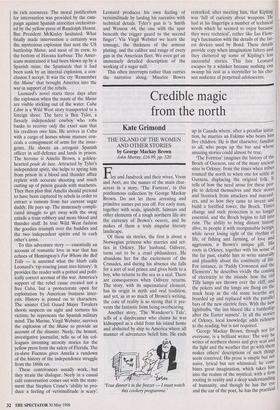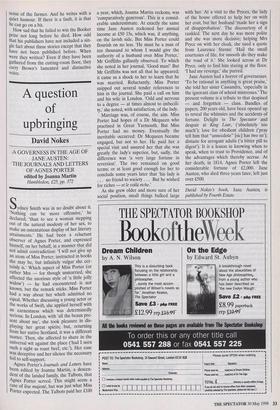Credible magic from the north
Kate Grimond
THE ISLAND OF THE WOMEN AND OTHER STORIES by George Mackay Brown John Murray, £16.99, pp. 320 Fey and Jandreck and their wives, Vrem and Aort, are the names of the main char- acters in a story, 'The Fortress', in this posthumous collection by George Mackay Brown. Do not let these arresting and primitive names put you off. For early man, together with seals, spindrift, fulmars and other elements of a tough northern life are the currency of Brown's oeuvre, and he makes of them a truly singular literary landscape.
Of these six stories, the first is about a Norwegian princess who marries and set- tles in Orkney. Her husband, Odivere, turns out to be a cruel philanderer. He abandons her for the excitement of the Crusades, and during his absence she falls for a sort of seal prince and gives birth to a boy, who returns to the sea as a seal. There are consequences when Odivere returns. The story, with its supernatural element, has its origin in myth and oral tradition, and yet, as in so much of Brown's writing, the core of reality is so strong that it pre- vents the fantastic from being overbearing.
Another story, 'The Wanderer's Tale', tells of a daydreamer who claims he was kidnapped as a child from his island home and abducted by ship to America where all manner of adventures befell him. He ends `Your dinner's in the freezer — I must watch this cookery programme.' up in Canada where, after a peculiar initia- tion, he marries an Eskimo who bears hint five children. He is that character, familiar to all, who props up the bar and whose amazing stories could almost be true. `The Fortress' imagines the history of the Broch of Gurness, one of the many ancient sites in Orkney, from the times when tribes roamed the north to when one lot settle at Gurness, displacing the original folk. It tells of how the need arose for these peo- ple to defend themselves and their stores, and livestock from attackers and maraud- ers, and so how they came to invent and build a fortified tower, the Broch. Times change and such protection is no longer essential, and the Broch begins to fall into ruin. The ability to bring distant history alive, to people it with recognisable beings, while never losing sight of the rhythm of life, of fishing and farming, of love and aggression, is Brown's unique gift. His roots in Orkney, together with his sense of the far past, enable him to write naturallY and plausibly about the continuity of life- For instance, in 'Paddy Crowsnest and the Elements', he describes vividly the coming of electricity to the islands: how the old Tilly lamps are thrown over the cliff, and the pokers and the tongs are flung on the muck heap as the old stone hearths are boarded up and replaced with the parallel bars of the new electric fires. With the new lightbulbs, 'the inn blazed like a battleship after the Easter sunsets'. In all the stories of Orkney, local knowledge adds richness to the reading, but is not required. George Mackay Brown, though not for everyone, is a brilliant writer. The way he writes of northern shores and grey seas and the light and the weather that go with them makes others' descriptions of such things seem contrived. His prose is simple but not naive, lyrical but not whimsical; he com- bines great imagination, which takes hut into the realms of the mystical, with a firm rooting in reality and a deep understanding of humanity, and though he has the eye and the ear of the poet, he has the practical sense of the farmer. And he writes with a quiet humour. If there is a fault, it is that he can go on a hit. How sad that he failed to win the Booker prize not long before he died. How odd that his publishers have not included a sin- gle fact about these stories except that they have not been published before. When were they written? Even if they have been gathered from the cutting-room floor, they carry Brown's lamented and distinctive voice.



































































 Previous page
Previous page